When it comes to domestic waste, food is still the largest contributor to landfill at 35%. The best way to reduce your impact is to stop putting kitchen scraps in the red lid bin.
If you want to replace your bin liners now that free supermarket plastic bags are a thing of the past, this is another reason to compost. The majority of wet, funky rubbish comes from food. So by composting your food waste you can remove the need for plastic bin liners altogether.
We've also put together some ways to compost, whether you live in a house or apartment.

1. In your kitchen
Food waste typically makes up around one-third of our residents’ red lid rubbish bins. By collecting and recycling food scraps separately, we can reduce waste to landfill. We can then convert the food scraps into compost for use on gardens and farms.
The City of Sydney has completed an important food scraps recycling trial involving the separate collection and recycling of food scraps from residential properties.
We've provided participating households with everything they need to separate their food scraps, including a food scraps bin, kitchen caddy and compostable caddy liners.
Instead of throwing everything into the red lid bin, residents involved in the trial collect food scraps in the kitchen caddy, then put them in a dedicated food scraps bin for collection and recycling. The food scraps are converted into compost for use on gardens and farms.
The service is currently available to over 21,000 households and we plan to roll out an offering to all residents.
2. In your backyard or balcony
You can set up a mini composting system even in limited space. Bokashi bins harness the power of good bacteria to ferment any kind of food waste. They are small, compact, sealed systems suitable for indoors. You can even keep one under your kitchen sink. Your local gardening store could provide more advice.
Worms can eat all your fruit and veggie scraps except for citrus, onion and chilli. The worm tea and castings produced by the worm farm are great fertilisers for your plants.
Learn the difference between composting and worm farming, and how to select the best system for you at this free Sydney City Farm talk.
Here are some more ideas for recycling your food scraps at home.

3. Shared green space
If you have shared green space in your apartment block, you can talk to your agent, landlord or strata about setting up a compost bin or worm farm. When establishing, make sure you provide plenty of instructions for other users, as you don’t want any animal products or other non-compostable bits in your bin.
Some basics: turn the compost regularly and use a combination of green (kitchen waste) and brown (shredded paper, straw, dry leaves) matter. Use the resulting fertiliser on your plants and share it with others.
Here are resources and information for building managers and building champions who want to recycle food scraps in their apartment buildings.
4. Community composting
Consider joining a community garden. Among many wonderful benefits, they usually offer composting facilities. You can also set up a community compost system.

5. Compost with friends
Work out an arrangement with your friends and bring over your compost with a Saturday morning coffee. If they have a worm farm, their worms will appreciate the food and their garden the nourishment. Or, if you don’t want to rely on your friends, find a friendly composter on ShareWaste.
6. Reduce waste
Even if you’re composting correctly, the goal always is to reduce waste as much as possible.
Avoid or reduce food waste by planning your meals, shopping wisely, being creative with leftovers, and storing food correctly.
Foodwise and Kitchen Hand are great resources for recipes and educational tools.
You can also find more about urban farming and growing your own food with Sydney City Farm.

Published 9 July 2018, updated 16 August 2024



